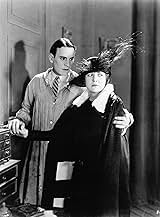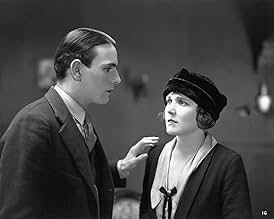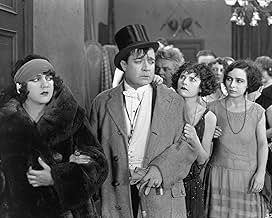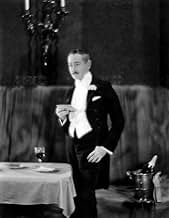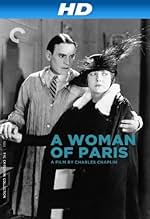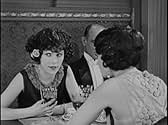NOTE IMDb
6,9/10
6,7 k
MA NOTE
Une femme attachée au train de vie que lui offre son mari rencontre son ancien fiancé et se retrouve tiraillée entre l'amour et un certain confort de vie.Une femme attachée au train de vie que lui offre son mari rencontre son ancien fiancé et se retrouve tiraillée entre l'amour et un certain confort de vie.Une femme attachée au train de vie que lui offre son mari rencontre son ancien fiancé et se retrouve tiraillée entre l'amour et un certain confort de vie.
- Réalisation
- Scénario
- Casting principal
- Récompenses
- 3 victoires au total
Charles K. French
- Jean's Father
- (as Charles French)
Nellie Bly Baker
- Masseuse
- (non crédité)
Henry Bergman
- Head Waiter
- (non crédité)
Charles Chaplin
- Station Porter
- (non crédité)
Frank Coghlan Jr.
- Boy
- (non crédité)
Antonio Corsi
- Accordion Player
- (non crédité)
Harry d'Abbadie d'Arrast
- Man in Nightclub
- (non crédité)
Stella De Lanti
- Revel's Fiancée
- (non confirmé)
- (non crédité)
Jean de Limur
- Man in Nightclub
- (non crédité)
Charles Farrell
- Man in Nightclub
- (non crédité)
Bess Flowers
- Mannequin
- (non crédité)
Avis à la une
If nothing else, you have to give Charlie Chaplin a lot of credit for taking a shot at something so different from his usual fare. (Though he himself only appears on-screen for a few seconds this time, he did almost everything else in the production.) And while "A Woman of Paris" is certainly a cut below his comedy features, it's a pretty good melodrama, and you'd have to think that with experience Chaplin could have gone on to become almost as effective with straight melodrama as he was with his sentimental comedies. It's not really surprising that after this he returned to comedy for good, but that was just to keep audiences happy, not because he couldn't do drama, since this is a decent effort.
Chaplin's own frequent lady Edna Purviance is convincing as the young woman whose tangled love affairs pull her away from her true love and into a set of tangled relationships in the empty, decadent world of the Parisian idle classes. Except for being rather contrived - there are far too many coincidences and pat developments in the plot, and they do not work as well in serious drama as they would in a comedy - the story is interesting and fairly creative. It does get a bit heavy at times, since there is very little comic relief, but Adolphe Menjou helps keep it from getting unbearably serious with a good performance as the carefree, irresponsible Pierre. He shows that even without dialogue he can make this kind of character lively and memorable.
Since it doesn't quite measure up to the standard of either the best Chaplin features or the best silent melodramas, "A Woman of Paris" may not have a niche of its own, except for its historical interest. But it's quite an interesting change of pace from Chaplin, and an above average movie that's worth seeing.
Chaplin's own frequent lady Edna Purviance is convincing as the young woman whose tangled love affairs pull her away from her true love and into a set of tangled relationships in the empty, decadent world of the Parisian idle classes. Except for being rather contrived - there are far too many coincidences and pat developments in the plot, and they do not work as well in serious drama as they would in a comedy - the story is interesting and fairly creative. It does get a bit heavy at times, since there is very little comic relief, but Adolphe Menjou helps keep it from getting unbearably serious with a good performance as the carefree, irresponsible Pierre. He shows that even without dialogue he can make this kind of character lively and memorable.
Since it doesn't quite measure up to the standard of either the best Chaplin features or the best silent melodramas, "A Woman of Paris" may not have a niche of its own, except for its historical interest. But it's quite an interesting change of pace from Chaplin, and an above average movie that's worth seeing.
Fans of Charlie Chaplin flocked to the theaters anticipating a good laugh in his next film, September 1923's "A Woman In Paris." Despite a disclaimer in the beginning of the movie that this was a serious drama, viewers paying to see a comedy were dismayed and disappointed by it. But movie critics loved it, praising its subtleties and emotional depth. As writer David Robinson stated, "Chaplin inaugurated a whole new style of comedy of manners, and new styles of acting to suit it...by revealing the inner workings of his characters' hearts and minds through their external actions and expressions."
Chaplin felt that his regular comedic sidekick, Edna Purviance, who appeared in over 30 of his films since 1915, was becoming too mature of an actress to continue doing slapstick. He wanted to feature her in a serious, dramatic role to illustrate her expressive and sincere yet sober acting abilities. Gleaming a story idea from one of the country's most gold-digging of multi-millionaire wives, Peggy Hopkins Joyce, Chaplin formulated a story on a woman who leaves for Paris on a train after her supposed fiancee doesn't show up at the platform. Marie (Purviance) hooks up with a rich businessman, Pierre (Adolphe Menjou), and lives the life of luxury, until she meets up with her former fiancee. A suicide spices up Chaplin's plot, all derived from Joyce's own personal experiences. The comedian at the time was having a fling with this most interesting Virginian-born woman, Peggy Joyce, whose fangs dug into six very lucrative marriages. She was famous for quotes such as "True love was a heavy diamond bracelet, preferably one that arrived with its price tag intact."
Once the public realized the movie was all serious and lacked a Chaplin presence (he did have a short cameo as a train porter), the chairs in the theaters playing it became empty. Chaplin was forced to pull "A Woman In Paris" prematurely, which, being his first film for his co-ownershipped United Artists, hit the company's bottom line.
Chaplin's original desire to launch a new direction for Purviance fell flat. Not only was the film a failure at the box office, but a New Year's Day incident of 1924 involving a male friend put a crimp on her future acting ambitions. Attending an intimate gathering of three at oil magnate Courtland Dines' apartment with actress Mabel Normand, Purviance witnessed chauffeur Horace Greer (alias Joe Kelley) arrival to pick up Mabel. Conflicting accounts were given as to what happened next: either Greer saw something that hinted Dines being caught in the act with Mabel, or the host unexplicably approaching him angerly waving a wine bottle. Whatever happened, the chauffeur shot Dines three times. Purviance went to the wounded Dines assistance, and for the next 90 minutes tried to staunch the wounds in his bed. Greer drove to the police station to give himself up while the two actresses finally called an ambulance. With Dines refusing to testify during the trial, the jury came back with a not guilty verdict.
The scandal, with all the rumors filling in the blanks, basically slowed Purviance's career to a crawl. She was in one other Chaplin film, 'A Woman of the Sea,' which the unhappy director destroyed, and a 1927 French film. Her two uncredited parts in Chaplin's later movies were her swan songs of the secretary who turned into a movie actress. She received a small monthly salary from Chaplin for the remainder of her life. When she passed away in 1958 at 62, Chaplin, who appeared in over 30 movies with the actress, said "How could I forget Edna? She was with me when it all began."
Chaplin felt that his regular comedic sidekick, Edna Purviance, who appeared in over 30 of his films since 1915, was becoming too mature of an actress to continue doing slapstick. He wanted to feature her in a serious, dramatic role to illustrate her expressive and sincere yet sober acting abilities. Gleaming a story idea from one of the country's most gold-digging of multi-millionaire wives, Peggy Hopkins Joyce, Chaplin formulated a story on a woman who leaves for Paris on a train after her supposed fiancee doesn't show up at the platform. Marie (Purviance) hooks up with a rich businessman, Pierre (Adolphe Menjou), and lives the life of luxury, until she meets up with her former fiancee. A suicide spices up Chaplin's plot, all derived from Joyce's own personal experiences. The comedian at the time was having a fling with this most interesting Virginian-born woman, Peggy Joyce, whose fangs dug into six very lucrative marriages. She was famous for quotes such as "True love was a heavy diamond bracelet, preferably one that arrived with its price tag intact."
Once the public realized the movie was all serious and lacked a Chaplin presence (he did have a short cameo as a train porter), the chairs in the theaters playing it became empty. Chaplin was forced to pull "A Woman In Paris" prematurely, which, being his first film for his co-ownershipped United Artists, hit the company's bottom line.
Chaplin's original desire to launch a new direction for Purviance fell flat. Not only was the film a failure at the box office, but a New Year's Day incident of 1924 involving a male friend put a crimp on her future acting ambitions. Attending an intimate gathering of three at oil magnate Courtland Dines' apartment with actress Mabel Normand, Purviance witnessed chauffeur Horace Greer (alias Joe Kelley) arrival to pick up Mabel. Conflicting accounts were given as to what happened next: either Greer saw something that hinted Dines being caught in the act with Mabel, or the host unexplicably approaching him angerly waving a wine bottle. Whatever happened, the chauffeur shot Dines three times. Purviance went to the wounded Dines assistance, and for the next 90 minutes tried to staunch the wounds in his bed. Greer drove to the police station to give himself up while the two actresses finally called an ambulance. With Dines refusing to testify during the trial, the jury came back with a not guilty verdict.
The scandal, with all the rumors filling in the blanks, basically slowed Purviance's career to a crawl. She was in one other Chaplin film, 'A Woman of the Sea,' which the unhappy director destroyed, and a 1927 French film. Her two uncredited parts in Chaplin's later movies were her swan songs of the secretary who turned into a movie actress. She received a small monthly salary from Chaplin for the remainder of her life. When she passed away in 1958 at 62, Chaplin, who appeared in over 30 movies with the actress, said "How could I forget Edna? She was with me when it all began."
Charles Chaplin is noted for his comedy performances, and deservedly.
His direction, though, should be more highly regarded, if only for this one motion picture.
Compare the quality of the photography and the smoothness of the editing to, for example, "The Gold Rush," of about the same time.
"A Woman of Paris" is very modern; "The Gold Rush" is downright primitive (but, in spots, brilliant).
"A Woman of Paris" also shows some admirable acting talent in, really, all the players. Some of the lesser characters are still played beautifully, despite being "lesser," especially Marie's maids and her, more or less, friends, and very especially the masseuse.
And the scene where the artist's mother, played by Lydia Knott, bent on revenge, comes upon Marie -- with no words, just body movement and facial expression -- she tells the audience what the proverbial thousand words could not so well.
Credit for part of that good acting must, of course, go to the director, but even the best director can't make much of poor actors.
Chaplin had very good actors. Adolphe Menjou reached stardom, and deservedly. What a tremendous talent; he could do everything.
Edna Purviance should have achieved much more acclaim. She performed admirably, especially in this movie, and she was attractive. Fame is certainly fickle.
In some ways, "A Woman of Paris" might be written off by a few as "soap opera." But it is well worth watching for the performances and, especially, for the directing.
His direction, though, should be more highly regarded, if only for this one motion picture.
Compare the quality of the photography and the smoothness of the editing to, for example, "The Gold Rush," of about the same time.
"A Woman of Paris" is very modern; "The Gold Rush" is downright primitive (but, in spots, brilliant).
"A Woman of Paris" also shows some admirable acting talent in, really, all the players. Some of the lesser characters are still played beautifully, despite being "lesser," especially Marie's maids and her, more or less, friends, and very especially the masseuse.
And the scene where the artist's mother, played by Lydia Knott, bent on revenge, comes upon Marie -- with no words, just body movement and facial expression -- she tells the audience what the proverbial thousand words could not so well.
Credit for part of that good acting must, of course, go to the director, but even the best director can't make much of poor actors.
Chaplin had very good actors. Adolphe Menjou reached stardom, and deservedly. What a tremendous talent; he could do everything.
Edna Purviance should have achieved much more acclaim. She performed admirably, especially in this movie, and she was attractive. Fame is certainly fickle.
In some ways, "A Woman of Paris" might be written off by a few as "soap opera." But it is well worth watching for the performances and, especially, for the directing.
1923's "A Woman of Paris is probably not what you'd expect in a Chaplin film based on the totality of his body of work, both in features and in shorts. However, that doesn't mean it's not worthwhile viewing. It just means if you are new to Chaplin, you might not want to start here.
"A Woman of Paris" showed Chaplin's talent behind the camera without him appearing in front of it, except for a lone cameo in which he quickly appears and then disappears acting as a luggage boy. He made it for two reasons, to do some pioneering in cinematic technique and to help give his long time costar and companion Edna Purviance a career boost. The film is actually quite good with great performances by Purviance and by Adolphe Menjou as a carefree playboy. The film did make a star out of Menjou. It didn't really help Purviance that much. The film is about a pair of star-crossed lovers that circumstance drives apart and then brings back together and the eventual tragedy that occurs due to the weakness of will of Purviance's character's one time fiancé, played by Carl Miller.
The film was a failure at the box office, not because it was bad, but because audiences expected to see Chaplin when they went to a Chaplin film. After the failure of this film, Chaplin went back to formulas that were tried and true for him and never really went out on a limb experimenting again, which is too bad for all of us.
"A Woman of Paris" showed Chaplin's talent behind the camera without him appearing in front of it, except for a lone cameo in which he quickly appears and then disappears acting as a luggage boy. He made it for two reasons, to do some pioneering in cinematic technique and to help give his long time costar and companion Edna Purviance a career boost. The film is actually quite good with great performances by Purviance and by Adolphe Menjou as a carefree playboy. The film did make a star out of Menjou. It didn't really help Purviance that much. The film is about a pair of star-crossed lovers that circumstance drives apart and then brings back together and the eventual tragedy that occurs due to the weakness of will of Purviance's character's one time fiancé, played by Carl Miller.
The film was a failure at the box office, not because it was bad, but because audiences expected to see Chaplin when they went to a Chaplin film. After the failure of this film, Chaplin went back to formulas that were tried and true for him and never really went out on a limb experimenting again, which is too bad for all of us.
I was looking in Charlie Chaplin's memoirs and I found that his original idea for the plot of A Woman Of Paris came from pillow talk with Peggy Hopkins Joyce involving one of her former boyfriends, a French publisher. From this came Charlie's idea to direct, but not appear in a film and hopefully make his long time leading lady from slapstick comedy, Edna Purviance a major dramatic star.
The reason given for the non-success of A Woman of Paris is usually given as the fact that people bought tickets and were disappointed that they did not see a Charlie Chaplin comedy. Probably on the silent screen, star images were even more fixed in people's minds than they were when sound came in.
But seeing it today it really does go overboard into melodrama. Edna's a simple country girl who loves Carl Miller, a struggling artist. Some blind mischances of fate and she winds up the paid woman of Parisian rake Adolphe Menjou. It's the tragedy of one romantic and the salvation of sorts for the other that are the basis of the story.
You couldn't make a film like it today, audiences would just laugh at it. In 1923 audiences were looking for laughs attached to the Chaplin name and found none. Edna does a fine job, but the public would not accept her in a drama. Adolphe Menjou as the rake comes off best in the cast.
The film ironically enough was Chaplin's first for the newly formed United Artists of which he was a quarter interest partner. After this one failed at the box office, he went back to cranking out the comedies we expected from him.
Back when I was working person at New York State Crime Victims Board, I had a claimant named Wayne Purviance who was the victim of an anti-gay bias attack in 1982. It was a crime that galvanized the GLBT people of New York City, this person in particular. Wayne was the grand nephew of Edna Purviance.
He's no longer among the living, but to you Wayne Purviance who took some real blows for millions of people, this review is lovingly dedicated to you and your wonderful aunt.
The reason given for the non-success of A Woman of Paris is usually given as the fact that people bought tickets and were disappointed that they did not see a Charlie Chaplin comedy. Probably on the silent screen, star images were even more fixed in people's minds than they were when sound came in.
But seeing it today it really does go overboard into melodrama. Edna's a simple country girl who loves Carl Miller, a struggling artist. Some blind mischances of fate and she winds up the paid woman of Parisian rake Adolphe Menjou. It's the tragedy of one romantic and the salvation of sorts for the other that are the basis of the story.
You couldn't make a film like it today, audiences would just laugh at it. In 1923 audiences were looking for laughs attached to the Chaplin name and found none. Edna does a fine job, but the public would not accept her in a drama. Adolphe Menjou as the rake comes off best in the cast.
The film ironically enough was Chaplin's first for the newly formed United Artists of which he was a quarter interest partner. After this one failed at the box office, he went back to cranking out the comedies we expected from him.
Back when I was working person at New York State Crime Victims Board, I had a claimant named Wayne Purviance who was the victim of an anti-gay bias attack in 1982. It was a crime that galvanized the GLBT people of New York City, this person in particular. Wayne was the grand nephew of Edna Purviance.
He's no longer among the living, but to you Wayne Purviance who took some real blows for millions of people, this review is lovingly dedicated to you and your wonderful aunt.
Le saviez-vous
- AnecdotesThe reissue of this film, with a musical score and new cut by Sir Charles Chaplin, was the last work of his entire film career. By then, the 87-year-old Chaplin was visibly frail but still walking. His score was aided by arranger Eric James, and he took a small theme from Monsieur Verdoux (1947), but most of the score was Chaplin's. The film was reissued posthumously in 1977 with the new score to overwhelming critical and public praise. At that time, many critics praised it (as in the trailer) as one of the best films ever made.
- GaffesWhen Jean starts fighting with Pierre in the restaurant, Pierre's glass of wine or champagne gets knocked over. When Pierre sits down on the table afterwards, the glass stands on the table filled with drink as if it hadn't been knocked over.
- Citations
[Intertitle]: Time heals, and experience teaches that the secret of happiness is in service to others.
- Versions alternativesDuring 1976, Chaplin was preparing a reissue of A Woman of Paris/Sunnyside but died before completion. The project was completed after his death, and the films were reissued in the United States by Kino International Corp. in 1978. This version, however, dispensed with an opening subtitle, as well as a few brief insert shots.
- ConnexionsFeatured in Chaplin Today: Modern Times (2003)
Meilleurs choix
Connectez-vous pour évaluer et suivre la liste de favoris afin de recevoir des recommandations personnalisées
- How long is A Woman of Paris: A Drama of Fate?Alimenté par Alexa
Détails
- Date de sortie
- Pays d’origine
- Site officiel
- Langue
- Aussi connu sous le nom de
- Una mujer de París
- Lieux de tournage
- Société de production
- Voir plus de crédits d'entreprise sur IMDbPro
Box-office
- Budget
- 351 000 $US (estimé)
- Montant brut mondial
- 12 921 $US
- Durée
- 1h 22min(82 min)
- Mixage
- Rapport de forme
- 1.33 : 1
Contribuer à cette page
Suggérer une modification ou ajouter du contenu manquant

